St Vincent’s chemo scandal: Failures of clinical governance
DOZENS of patients treated by a St Vincent’s Hospital doctor who underdosed their chemotherapy have since died of a variety of causes, with a report finding the public was misled on the treatment.
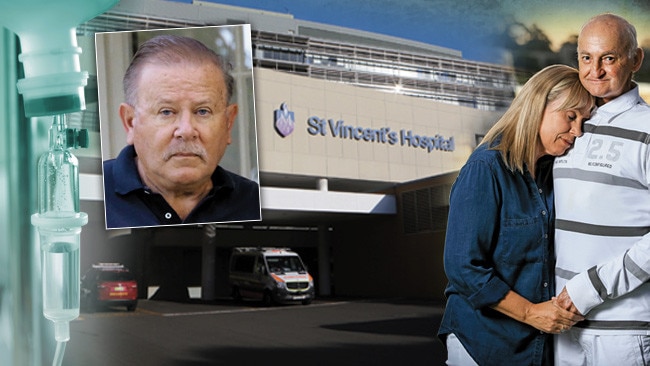
NSW
Don't miss out on the headlines from NSW. Followed categories will be added to My News.
23 patients out of 78 died, with report outlining how doctor treated them with low doses of chemo treatment
Staff raised concerns about Dr John Grygiel, but ‘little was done’
Executive hospital staff showed ‘no sense of urgency’
DOZENS of patients treated by a St Vincent’s Hospital doctor who underdosed their chemotherapy have since died of a variety of causes, with a report finding the public was misled on the treatment.
A government-ordered review of the scandal has found the hospital made “factual errors” and “key omissions” after it was revealed 78 of Dr John Grygiel’s patients, including 30 who have died, were underdosed with the chemotherapy drug carboplatin.
The patients were treated between 2012 and 2015 but the review by Cancer Institute NSW CEO Professor David Currow, commissioned by the NSW Health Secretary, will now be extended to other patients treated over the past decade by the oncologist at three other hospitals, including two in western NSW.
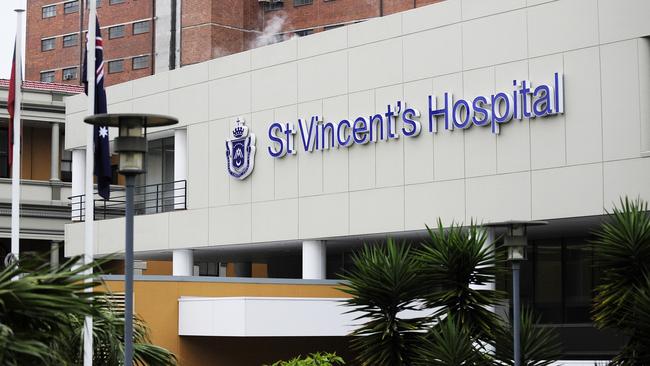
St Vincent’s had previously stated that just five of those patients suffered a recurrence of their cancer and prior to the revelation it had been reported that two had died.
Key among the hospital’s false or misleading statements were claims that just 70 patients were involved and that they suffered no “negative impacts” as a result of the mistreatment.
The hospital had conducted no studies to prove that statement.
The report found that while it could not link the underdosing to deaths “it would be expected that on a population basis, a failure to adhere to protocols is likely to result in higher rates of local recurrence and higher overall mortality”.
The 100mg dose of carboplatin is described in an interim report into the scandal as “off protocol” and was around half to one-third less than the normal amount that would be prescribed to a head and neck cancer patient.
Staff repeatedly warned on “many occasions” of the underdosing but Dr Grygiel’s explanation was always accepted without question and no clinical incident reports were ever made in a drastic failure of clinical governance.
“Junior pharmacists, nurses and doctors who have practised in medical oncology at St Vincent’s Hospital during these years have either challenged the practice or sought an explanation for it,” the report revealed.
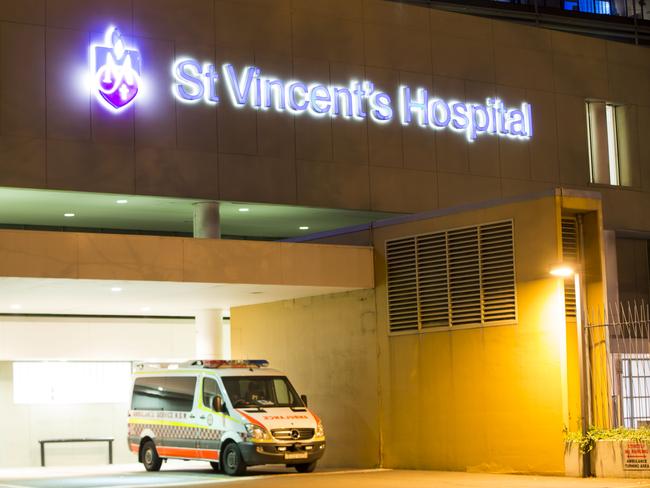
“The practice was widely known and senior pharmacy and nursing staff either knew, or should have known, it was occurring.”
The hospital falsely claimed Dr Grygiel, who was stood down in February and is currently overseas, was “immediately counselled and placed under supervision” but the review found “in fact, this did not occur”.
The hospital failed to alert patients and their families until a media report in February, despite knowing of the scandal for six months.
When the hospital did review the scandal it showed no urgency, set no terms of reference and failed to consider “clinical outcomes such as survival or cancer recurrence”.
“Given that the review was generated in part by the concerns about the rate of recurrence of people with head and neck cancers, it is not clear why the internal review failed to define relevant clinical and patient factors,” Prof Curnow found.
The report also found “public statements by St Vincent’s Hospital about Dr Grygiel’s prescribing practices did not fully reflect the magnitude of the issue of its consequences”.
“The initial statements contained important factual errors ... as well as key omissions.”
The head of the department of medical oncology for most of the time Dr Grygiel treated patients was unavailable for interview, as was Dr Grygiel. They were both overseas. However, they have indicated they will return this month to assist with a final report due out in July.
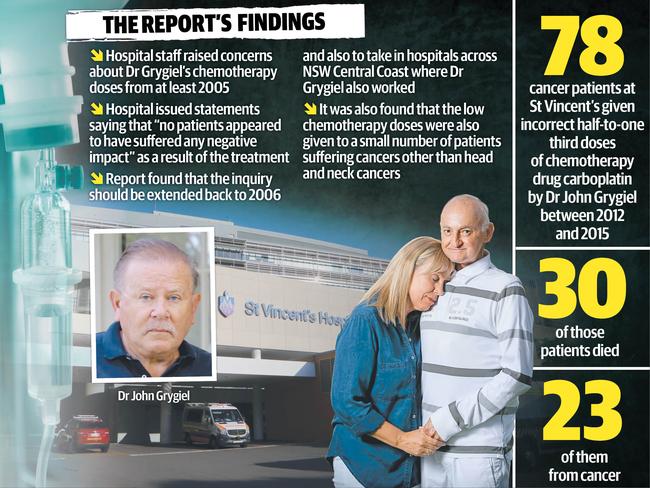
In February, Dr Grygiel told The Daily Telegraph the original ABC report on the chemotherapy treatment was a “beat-up” and he had put the matter in the hands of his lawyers.
“I know that the patients weren’t harmed and they suffered no damage from the lower dose that was administered, so there’s nothing to apologise for,” he said.
Legal experts said the hospital had opened itself up to potential lawsuits.
Caryn Ger, medical negligence practice leader at Shine Lawyers, said families who lost loved ones after being treated by Dr Grygiel could potentially take legal action against St Vincent’s Hospital, which issued a lengthy apology last night and whose CEO Toby Hall sidestepped questions about his future in the job.
“We should have had better systems to pick up the treatment regimen he was following. It was clearly a flawed model of treatment and we absolutely apologise to patients for our failure to pick this up earlier,” Mr Hall told the Daily Telegraph.
Health Minister Jillian Skinner said she was concerned, but was unable to sack senior executives at St Vincent’s because that is a responsibility of its board.
HUMAN TRAGEDY AND THE UNSPEAKABLE LOSS LEFT BY SERIES OF MEDICAL FAILINGS
Ashleigh Gleeson
KEN Dugdale can’t speak any more because of his cancer — but he wants his anger over the St Vincent’s Hospital chemotherapy cover-up to be heard.
He was one of 78 patients given an incorrect dose of chemotherapy. Less than a year after having the chemo his cancer came back.
The 66-year-old’s voice box had to be removed and he now eats through a tube.
The cancer came back once again in June last year.
His wife Natalie last night said they were horrified to finally learn of the report’s findings.
“To find out the degree of this … I’m just … words can’t even describe it,” she said. “I think it’s alarming — 78 people received this treatment and 30 have died.”
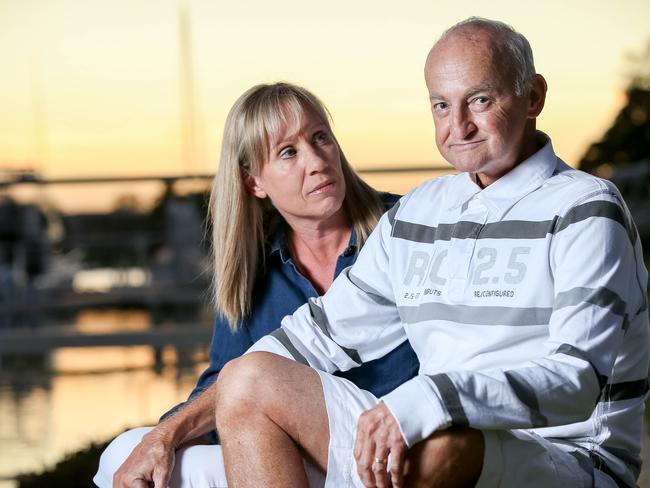
Mrs Dugdale said she regularly kept in contact with other families who were also incorrectly underdosed by oncologist Dr John Grygiel.
One man had only just been told his cancer had come back — and this time it was terminal.
“This couple has only just been told today,” she said. “Soon the figure is going to become 31.”
The pair were only told Ken was wrongly dosed two months ago — two years after the treatment.
She said they had to push to get an answer after seeing a report in the media.
Dr Grygiel was not available, she said, and another doctor gave them the devastating news.
“We were told he was getting a low dose at the time but we didn’t know he was being underdosed,” Natalie said. “We actually asked for him to have stronger chemo because my father has had the same cancer so we know how aggressive it is.
“So we wanted more but they said ‘no, this is having the best result without having all the side effects’. Ken trusted the doctors and thought they knew best.”
She was shocked at the lack of action from the hospital detailed in the report and for how long it went on.
“It’s his (Dr Gygiel’s) responsibility but they all knew about it,” she said.
Mr Dugdale, a father of two, ran a motor dealership at Nambucca Heads for 33 years before his diagnosis.
“He had to close his business and our life has changed,” Natalie said. “Ken can’t go out to dinner with friends, he can’t socialise, he can’t eat or talk — he has no quality of life.”
Breast cancer survivor Janine Braithwaite and her sister, Adele Webb, who died of colon cancer, were both treated by Dr Grygiel in Orange. She said it was extremely concerning the interim report said concerns about the oncologist’s underdosing of head and neck cancers went back to at least 2005. “I’m gobsmacked,” she said. “It’s very concerning.”
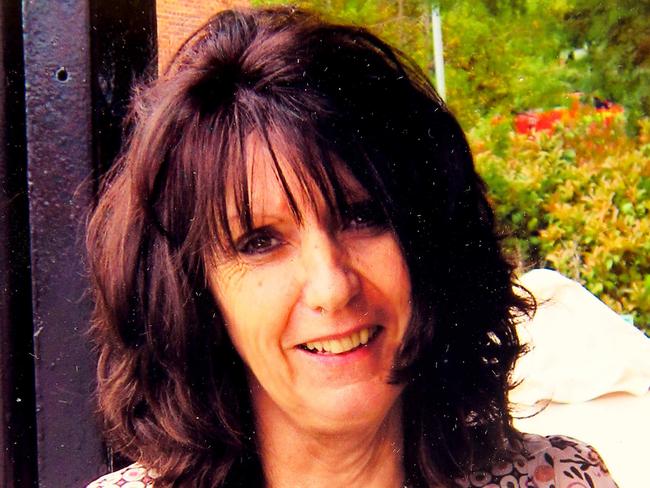
DOCTORS CRITICAL OF INCREASED DEATH RISK
Clarissa Bye
MEDICAL experts say the cancer patients at the centre of the St Vincent’s chemotherapy scandal may have faced a “significant increased risk of death” as a result of the unorthodox dosage and type of drugs used.
Doctors have not only criticised the low dosage of chemo drugs prescribed to the cancer victims, they have also questioned why other drugs weren’t used.
The “unorthodox” treatment, giving a flat 100mg of the drug carboplatin to most patients regardless of gender, weight and age, “had no data to support its use”, doctors said.
Cancer specialist Dr Brian Stein, from the Adelaide Cancer Centre, said carboplatin was an “inferior” choice compared with other more effective drugs such as cisplatin, particularly at a low flat dose.
“The consequences of this are a significant increased risk of death,” he said. “The degree of increase in the proportion of patients dying is unclear. You would expect 10-20 per cent more patients to die if the regimen is completely useless.
“Flat dosing is not a logical choice. Given the flat dose of 100mg has no data to support its use we must be even more concerned that this is an inferior regimen. I am at a loss to understand how any medical oncologist with familiarity with either carboplatin or head and neck oncology would choose to use this regimen.”
Of the 78 patients prescribed the flat 100mg of the drug, 23 have died of cancer, three of other causes and four from an “unspecified” cause.
In Australia, about 68 per cent of head and neck cancer patients usually survive after five years. Investigators were unable to say if the death rate was unusual as more frail patients were treated.
But with a 32 per cent mortality rate for the disease, the usual outcome would be almost 25 deaths after five years.


